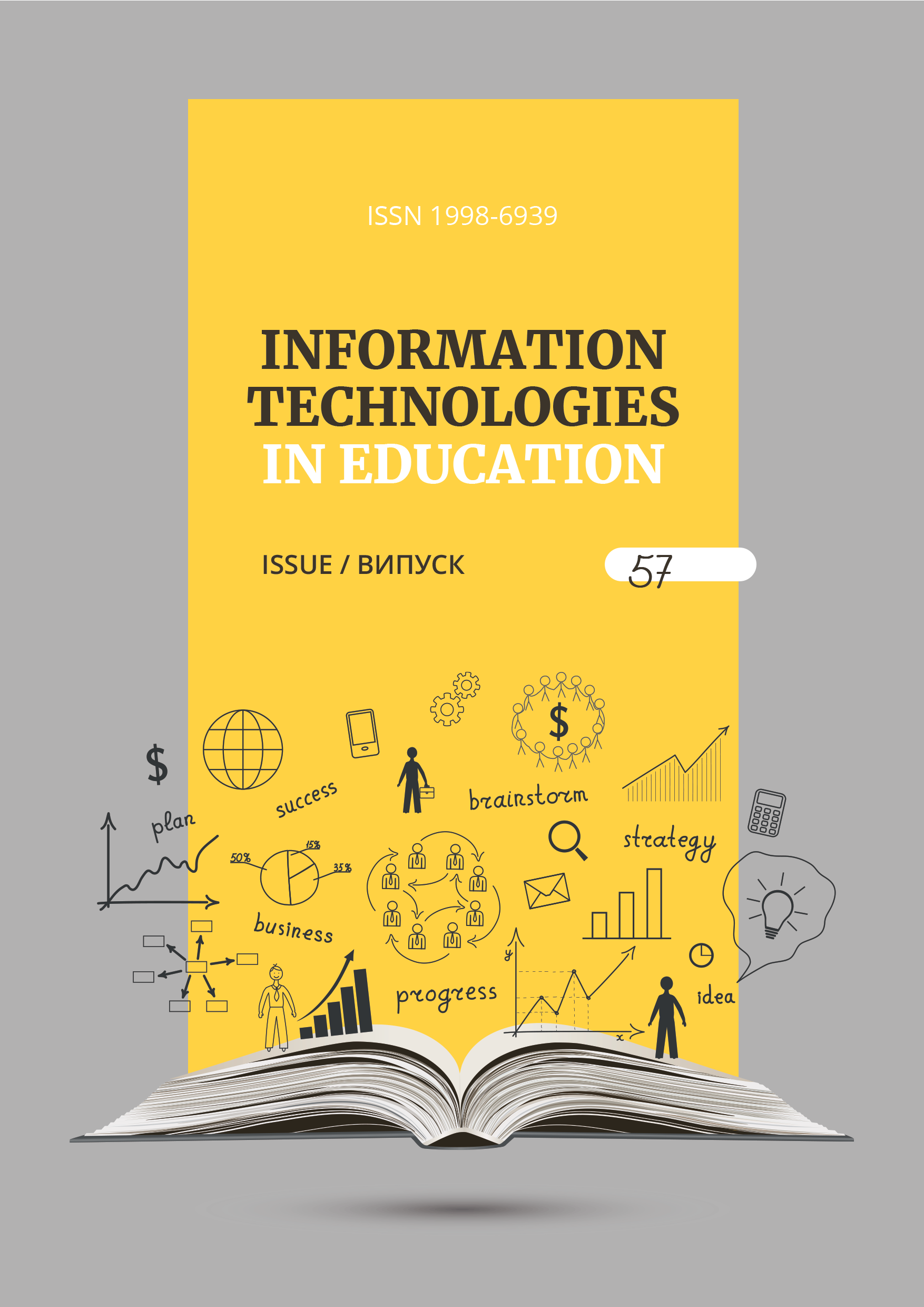ANALYSIS OF THE INFLUENCE OF TEACHING METHODS ON STUDENTS' ACADEMIC EMOTIONS DURING SYNCHRONOUS INTERACTION USING AI
DOI:
https://doi.org/10.14308/ite000793Keywords:
academic emotions, attention, engagement, emotional stateAbstract
In modern education, an important factor in the quality of specialist training at different levels of training and educational programs is the determination of students' academic emotions. Taking this factor into account by teachers of educational institutions can significantly affect the level of organization of the educational process, student's academic performance, their ability to learn different types of educational content depending on the method of teaching, as well as affect motivation and satisfaction by controlling their level of attention and engagement during synchronous interaction. The paper analyses students' academic emotions during lectures using different teaching methods and investigates their impact on attention and engagement. The pedagogical experiment was conducted among the 2nd year Bachelor's degree students majoring in 121 ‘Software Engineering’ at the Faculty of Information Technology of the National University of Life and Environmental Sciences of Ukraine (NULES). The study used three teaching methods during online lectures in synchronous mode, namely: visual (demonstration of presentation slides); brainstorming method (discussion of key issues of the lecture); case method (demonstration of a practice-oriented task), as well as a AI tool (MorphCast Emotion AI) for recognizing students' academic emotions in real-time. MorphCast Emotion AI allows the teacher to track the level of student engagement during a synchronous lecture, offering recommendations based on the data obtained, when to take breaks, how to adapt and adjust teaching methods, forms of educational content delivery, or adapt the sequence of topics within the discipline. After the class, detailed statistics on the level of engagement and attention help to plan further synchronous courses, ensuring that each online lecture is as effective and efficient as possible for students in today's environment.
Downloads
Metrics
References
Linh, N. T. N. (2024). Strategies for developing emotional intelligence in Generation Z students in higher education in Ho Chi Minh City. Educational Administration: Theory and Practice, 30(5), 2517–2522. https://doi.org/10.53555/kuey.v30i5.3313
Ngo, D., Nguyen, A., Dang, B., & Ngo, H. (2024). Facial expression recognition for examining emotional regulation in synchronous online collaborative learning. International Journal of Artificial Intelligence in Education, 1–20. https://doi.org/10.1007/s40593-023-00378-7
Nguyen, A., Hong, Y., Dang, B., & Nguyen, P. T. B. (2022). Emotional regulation in synchronous online collaborative learning: A facial expression recognition study.
Adesola, S. A., Li, Y., & Liu, X. (2019, March). Effect of Emotions on Students Learning Strategies. In Proceedings of the 2019 8th International Conference on Educational and Information Technology, 153–156). https://doi.org/10.1145/3318396.3318408
Yu, J., Huang, C., Wang, X., & Tu, Y. (2020, August). Exploring the relationships among interaction, emotional engagement and learning persistence in online learning environments. In 2020 International Symposium on Educational Technology (ISET), 293–297. IEEE. DOI: 10.1109/ISET49818.2020.00070.
Earl, S. R., Bishop, D., Miller, K., Davison, E., & Pickerell, L. (2024). First‐year students' achievement emotions at university: A cluster analytic approach to understand variability in attendance and attainment. British Journal of Educational Psychology, 94(2), 367–386. https://doi.org/10.1111/bjep.12650
Camacho-Morles, J., Slemp, G. R., Pekrun, R., Loderer, K., Hou, H., & Oades, L. G. (2021). Activity achievement emotions and academic performance: A meta-analysis. Educational Psychology Review, 33(3), 1051–1095. https://doi.org/10.1007/s10648-020-09585-3
Anwar, A., Rehman, I. U., Nasralla, M. M., Khattak, S. B. A., & Khilji, N. (2023, September). Sentiment Analysis and Student Emotions: Improving Satisfaction in Online Learning Platforms. In 2023 IEEE International Smart Cities Conference (ISC2), 1–7. IEEE. doi: 10.1109/ISC257844.2023.10293422.
Kurniawati, R. D., & Putro, A. A. Y. (2023, December). Recognition of Emotions to Increase Student Self-Efficacy in Learning. In 2nd UPY International Conference on Education and Social Science (UPINCESS 2023), 287–291. Atlantis Press. https://doi.org/10.2991/978-2-38476-176-0_41.
Estrada, М., Cabada, R., Oramas, R. (2019). Emotion Recognition for Education using Sentiment Analysis. Research in Computing Science, 148(5), 71–80. DOI: 10.13053/rcs-148-5-8.
Miele, D. (2009). Handbook of motivation at school (Vol. 704). K. R. Wentzel, & A. Wigfield (Eds.). New York, NY: Routledge.
Shahzad, G., Nawaz, H., Sardaraz, K., & Ullah, W. (2022). Interplay Of Students' Academic Emotions And Academic Achievement At Higher Secondary School Level. Journal of Positive School Psychology, 6(9).
Wu, R., & Yu, Z. (2022). Exploring the effects of achievement emotions on online learning outcomes: A systematic review. Frontiers in psychology, 13, 977931.
Pekrun, R., Lichtenfeld, S., Marsh, H. W., Murayama, K., & Goetz, T. (2017). Achievement emotions and academic performance: Longitudinal models of reciprocal effects. Child development, 88(5), 1653–1670. doi: 10.1111/cdev.12704
Pan, X., Hu, B., Zhou, Z., & Feng, X. (2023). Are students happier the more they learn?–research on the influence of course progress on academic emotion in online learning. Interactive Learning Environments, 31(10), 6869–6889. doi: 10.1080/10494820.2022.2052110
Nair, H. B. (2022). Impact of Negative Emotions on Student Education in India. Nair HB (2022). Impact of Negative Emotions on Student Education in India. International Journal of Indian Psychology, 10(2), 060–063. DIP:18.01.006.20221002, DOI:10.25215/1002.006, Available at SSRN: https://ssrn.com/abstract=4686366
Sahraie, F., Rezvanfar, A., Movahedmohammadi, S. H., Ebner, M., & Farrokhnia, M. (2024). Analysis of learners' emotions in e-learning environments based on cognitive sciences. International Journal of Interactive Mobile Technologies, 18(7), 34–52. https://doi.org/10.3991/ijim.v18i07.48471
Downloads
Published
How to Cite
Issue
Section
License
Copyright (c) 2025 Олена Глазунова, Інна Савицька, Володимир Кравченко, Валентина Корольчук, Тетяна Волошина, Таїсія Саяпіна

This work is licensed under a Creative Commons Attribution-NonCommercial-ShareAlike 4.0 International License.
This work is licensed under a Creative Commons Attribution-NonCommercial-ShareAlike 4.0 International License.






























